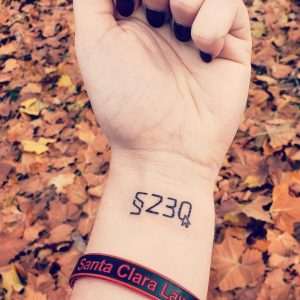Notifying Twitter of TOS Violations Isn’t Tortious Interference–Illoominate v. CAIR
Wikipedia describes Laura Loomer as a “conspiracy theorist.” Twitter banned her in 2018. I previously blogged on Loomer’s unsuccessful antitrust case against Twitter and other social media platforms. In this lawsuit, she seeks to hold CAIR responsible for her Twitter ban. She claims that CAIR’s alleged reporting of her Twitter posts constitutes tortious interference. The court calls her case “nonsensical” and dismisses it.
The court says that Loomer’s relationship with her Twitter followers don’t qualify as a protected “business relationship.” The court says: “Loomer’s relationship with her Twitter followers—no matter how economically beneficial such a relationship may have been—is a relationship with the community at large, not with identifiable customers.” While state laws may differ on this point, this is a helpful standard for any tortious interference claims that might arise in social media account ownership disputes.
 Loomer also claimed that the ban interfered with her contract with Twitter. But Twitter never guaranteed her anything, so there wasn’t any business relationship to recognize. Instead, Section 230 protect Twitter’s decision “to exercise traditional editorial functions, such as moderating content on its platform… Plaintiffs cannot use a claim of tortious interference with a business relationship as an end-run around the CDA’s explicit prohibition that Twitter cannot be held liable for its decision to moderate content on its platform. ”
Loomer also claimed that the ban interfered with her contract with Twitter. But Twitter never guaranteed her anything, so there wasn’t any business relationship to recognize. Instead, Section 230 protect Twitter’s decision “to exercise traditional editorial functions, such as moderating content on its platform… Plaintiffs cannot use a claim of tortious interference with a business relationship as an end-run around the CDA’s explicit prohibition that Twitter cannot be held liable for its decision to moderate content on its platform. ”
I think the court is trying to say that Section 230 gives Twitter the unfettered right to terminate Loomer’s account, so Twitter’s decision to ban her–even if Twitter acted in response to bogus reports from other users–didn’t deprive Loomer of anything. Unfortunately, the court garbles this point pretty badly. First, it cites “230(b)(1)-(2),” which is presumably a wince-inducing typo. Second, 230(c)(2) is more apropos to the liability for account terminations than 230(c)(1), though courts have expanded (c)(1) to cover this front. Third, there’s the question of who is being held liable for what. Twitter would qualify for 230(c), but here Loomer is trying to hold the report-submitter CAIR liable, and CAIR doesn’t qualify for 230(c) in this circumstance. So Section 230(c) is being used in a roundabout way to confirm Twitter lacks a “must-carry” obligation towards Loomer’s content. Fourth and finally, Twitter might not qualify for 230(c) if it had been directly alleged to commit intentional tortious interference based on its own actions, though it should qualify for 230(c) against any tortious interference claims based on Twitter’s publication of third-party content.
The court concludes with the broad proposition that submitting a bad-content report to Twitter should never qualify as tortious interference. The court says: “Plaintiffs’ suggestion that the mere reporting of a Twitter user—however insistent such reporting may be—is sufficient to constitute tortious interference in a business relationship between Twitter and the targeted user is, to put it mildly, nonsensical. A cause of action for tortious interference simply cannot exist each time an individual reports another Twitter user.” While I’m sympathetic to this approach, we do know that takedown notices are routinely weaponized. For example, online marketplace competitors can use takedown notices to thwart their rivals; or recall how people opposed to sex work were using takedown notices to try to cut off sex workers from payment services. So sending a takedown notice can be improper, and perhaps some of those circumstances might qualify as tortious interference. Twitter’s ban of Loomer almost certainly is something else.
Case citation: Illoominate Media, Inc. v. CAIR Foundation, 9:19-cv-81179-RAR (S.D. Fla. Nov. 11, 2019)

Pingback: News of the Week; December 4, 2019 – Communications Law at Allard Hall()